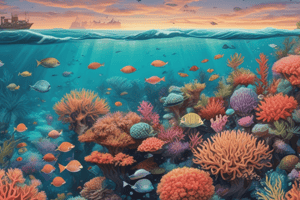Podcast
Questions and Answers
What is the primary reason why most coral reefs are restricted to tropical regions?
What is the primary reason why most coral reefs are restricted to tropical regions?
- Tropical regions have more diverse species that contribute to coral reef structure
- Tropical regions have higher levels of magnesium and calcium carbonates for reef formation
- Tropical regions have the ideal warm, marine, and sunny conditions for reef growth (correct)
- Tropical regions have less predators that feed on coral reefs
What percentage of the world's ocean surface do coral reefs occupy?
What percentage of the world's ocean surface do coral reefs occupy?
- Less than 0.1% (correct)
- 10%
- 5%
- 1%
What are hermatypic corals known for?
What are hermatypic corals known for?
- Contributing to coral reef structure (correct)
- Being non-essential for coral reef formation
- Requiring cold, deep waters for growth
- Being the smallest species of corals
What is the biological activity responsible for the formation of coral reefs?
What is the biological activity responsible for the formation of coral reefs?
What is the Phylum of corals, which includes anemones, corals, jellyfish, and hydrozoans?
What is the Phylum of corals, which includes anemones, corals, jellyfish, and hydrozoans?
What contributes to the wave-resistance of coral reefs?
What contributes to the wave-resistance of coral reefs?
What is the main opening to the gut (gastrovascular) cavity in Cnidarians?
What is the main opening to the gut (gastrovascular) cavity in Cnidarians?
Which body plan of Cnidarians is associated with the benthic environment?
Which body plan of Cnidarians is associated with the benthic environment?
Which class of Cnidarians includes anemones and corals?
Which class of Cnidarians includes anemones and corals?
What is a characteristic feature of the order Scleractinia (= Madreporaria)?
What is a characteristic feature of the order Scleractinia (= Madreporaria)?
Which type of corals are reef-building species?
Which type of corals are reef-building species?
What does Halimeda refer to in the context of coral benefits?
What does Halimeda refer to in the context of coral benefits?
What happens to coral when it does not receive proper light and temperature?
What happens to coral when it does not receive proper light and temperature?
What causes reefs to grow according to the text?
What causes reefs to grow according to the text?
Study Notes
Coral Reefs
- Coral reefs are primarily restricted to tropical regions because of their requirement for warm, shallow, and sunlit waters.
Coral Reef Distribution
- Coral reefs occupy only about 0.1% of the world's ocean surface.
Hermatypic Corals
- Hermatypic corals are known for their symbiotic relationship with algae, which provides them with nutrients.
Coral Reef Formation
- The biological activity responsible for the formation of coral reefs is the symbiotic relationship between corals and algae.
Phylum of Corals
- Corals, along with anemones, jellyfish, and hydrozoans, belong to the Phylum Cnidaria.
Wave-Resistance of Coral Reefs
- The complex structure of coral skeletons contributes to the wave-resistance of coral reefs.
Cnidarian Anatomy
- The main opening to the gut (gastrovascular) cavity in Cnidarians is called the mouth.
Cnidarian Body Plans
- The polyp body plan of Cnidarians is associated with the benthic environment.
Classes of Cnidarians
- The class Anthozoa includes anemones and corals.
Order Scleractinia
- A characteristic feature of the order Scleractinia (also known as Madreporaria) is the presence of stony skeletons.
Reef-Building Corals
- Scleractinian corals, also known as stony corals, are the primary reef-building species.
Halimeda
- Halimeda refers to a type of green algae that produces limestone, contributing to the growth of coral reefs.
Coral Stress
- When coral does not receive proper light and temperature, it becomes stressed and may expel its algal symbionts.
Reef Growth
- Reefs grow as a result of the accumulation of coral skeletons and other calcium carbonate deposits.
Studying That Suits You
Use AI to generate personalized quizzes and flashcards to suit your learning preferences.
Description
Test your knowledge about coral reefs with this quiz based on the lecture topics like the formation of coral reefs, their restriction to tropical regions, primary productivity, species diversity, and threats to coral reefs.



